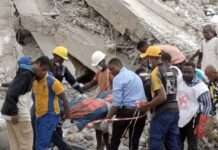As more information is unfolding about the situation of the deadly Lassa fever ravaging the country, the Nigeria Centre for Disease Control (NCDC) has disclosed that a total number of 103 lives have been lost since the outbreak of the disease in Nigeria.
The NCDC made the disclosure through its latest weekly report on the acute haemorrhagic fever titled: “Epi. Weekly 07” for the period within 10-16 February 2020, on Wednesday.
Meanwhile the Lagos State Ministry of Health (LSMOH) through its biosecurity unit has identified 63 people who possibly may have come in contact with the first patient, and has placed them under surveillance for early detection to stop further transmission of the infection.

The State’s Commissioner for Health Prof. Akin Abayomi during a press conference held in Alausa on Wednesday intimated journalists on efforts made so far by the LSMOH team to track all suspected contacts with the index Lassa fever case to prevent the spread of the virus.
“Lagos recorded one confirmed case of Lassa fever yesterday. The patient is currently in isolation and receiving treatment through its Epidemiology, Biosecurity and Global Health Directorate has commenced contact tracing to determine those who may have been infected while other surveillance and biosecurity strategies have been stepped up to prevent any further spread.
“He is on active treatment there and from the preliminary information available to us, the treatment is on-going satisfactorily.
“In our interrogation, there was no obvious contact with anybody prior to his arrival in Lagos but the test was confirmed as positive on the 17th of this month and he was then immediately transferred to the isolation containment facility within LUTH where he remains today”, Abayomi asserted.
The NCDC situation report on the outbreak from the national scene indicated that there was sharp increase in number of new confirmed cases from 109 cases in Week 06, 2020 to 115 cases in Week 07. And these cases were reported from 16 states of (Ondo, Edo, Ebonyi, Kano, Kogi, Kaduna, Taraba, Plateau, Bauchi, Enugu, Abia, Benue, Borno, Gombe, Sokoto and Katsina).
The report further revealed the cumulative fatality rate (CFR) from week 1 to week 07, 2020, as 103 deaths, put at 17.6 percent which is lower than the CFR for the same period in 2019 (21.1%). In total for 2020, 26 states have recorded at least one confirmed case across 101 Local Government Areas.
The report reads in part: “Of all confirmed cases, 73 percent are from Edo (35%), Ondo (32%) and Ebonyi (6%) states. The predominant age group affected is 21-30 years (range: <1 to 78 years, median age: 33 years).

“The male to female ratio for confirmed cases is 1:1.2, while the number of suspected cases has significantly increased compared to that reported for the same period in 2019. Two new healthcare workers, were affected in Bauchi and Katsina states in reporting week 07”.
However, further information from the agency showed that it has scaled up the degree of emergency response as the document stated that National Rapid Response Teams have been deployed from NCDC to support response activities in nine states.
“State Public Health Emergency Operations Centre have been activated in affected states. The five molecular laboratories for Lassa fever testing in the NCDC network are working at full capacity to ensure that all samples are tested and results provided within the shortest turnaround time. While NCDC is working to support states in Nigeria to identify a treatment centre in every state, while supporting existing ones with care, treatment and IPC commodities. Risk communications and community engagement activities have been scaled up across states using television, radio, print, social media and other strategies”, the agency disclosed.














buying prescription drugs from canada: https://genericwdp.com/ best online international pharmacies india
tadalafil max dose: http://tadalafilonline20.com/ tadalafil 30 mg